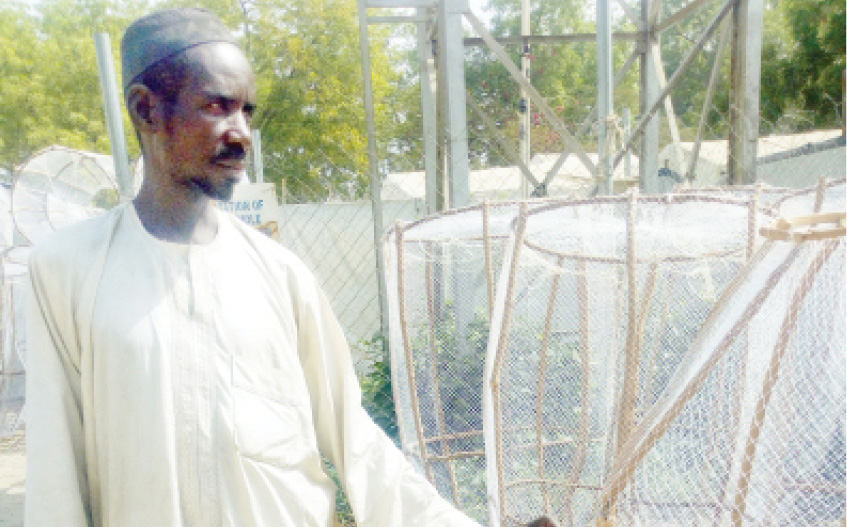Apart from the baits attached to hooks and nets to entice and catch fish on the Lake Chad, the fishermen of Doron Baga, a community on the shores of the Lake Chad in Kukawa Local Government Area of Borno State, have several other fishing techniques. Notable among them is the use of the Malian trap (gura).
The fishermen abandoned their means of livelihood after they were displaced by insurgents, but there is an atmosphere of anticipation in their temporary settlement in Maiduguri after the government promised to return them to Doro.
- The Amina Abdullahi Umar Ganduje you all don’t know
- As Nigeria’s Guardian of Arabic retires from Unilorin to Auchi
Doro and neighbouring fishing villages and islands in the lake were displaced by the insurgents twice thereby devastating the lives and livelihoods of the rural communities. The insurgents attacked the villages in 2014 and chased away most of the inhabitants before they took control of the areas.
Thereafter, troops launched offensives that saw the dislodgment of the insurgents from most the Nigerian territories.
The residents, who sought refuge in places as far as Monguno and Maiduguri, returned to their communities and continued fishing, but it did not take long.
A fisherman, Musa Danbaba, said, “We returned but the insurgents still controlled the neighbouring communities in other countries. They gave fishing permits after the payment of N5,000 to them. I personally paid the money and obtained the fishing permit.”
The fishing community of Doro was attacked again in December, 2018, and many families fled and sought refuge in Maiduguri.
Danbaba said neighbouring villages that were deserted alongside Doro such as Baga had received some returnees with the effort of the state government which pledged to resettle all displaced persons safely in their ancestral lands before May, 2021,
Danbaba said, “We are tired of living in temporary settlements and relying on handouts. Most of the families you see here were wealthy and prosperous before we were forced out. And with the assurances of the governor to facilitate our return, most of us have stated assembling our fishing tools. We want to go back.
“We only need humanitarian aid for at least two weeks and life will begin to pick up. We have started making our fishing tools here in our camp in Maiduguri.”
The most popular fishing gear in Doro is the gura which comes in two types: gurar Mali (Malian trap) and gurar Kagi. The Malian trap is easy to operate.
Danbaba explained that many displaced fishermen had been assembling their traps from locally sourced materials, adding that the trap was introduced to Doro by Malian fishermen who came to Nigeria during the President Shehu Shagari administration between 1979 and 1983 and that since then it had become a household fishing method.
The frame is made from the sticks of geza, a semi-arid region plant that grows in many parts of Kano, Jigawa and Katsina states. The sticks are assembled in form of an enclosure where the trapped fish will remain before it is removed. Nylon netting is wrapped on the frame. About seven non-return entrance valves are made with elastic nylon netting at the lowest part of the trap which allows the fish to pass in.
Danbaba further said, “The newly made trap produces an unpleasant odour from the geza sticks when placed in water, which scares away most fishes except two types: eel, and hana noma, a poisonous species. However, after about a month in the water, the back of the sticks will dissolve and the irritating smell disappears, which allows many species of fish to move closer and get trapped.

He said the trap would have been made in large quantities but that, “The stick is difficult to obtain here that is why we shall soon resort to other trees to get the sticks required to assemble the traps. A man brought a bundle of 100 sticks to Baga market and sold it for N3,000; it is expensive. Each trap is made at the cost of N2,500 and could be sold at higher prices.”
Another fisherman from Doro living in a temporary settlement along Baga Road in Maiduguri, Malam Sani Dansabo, said he used long fishing nets which were woven with threads and that he had started making the nets before he eventually returned to his hometown.
Malam Dansabo said, “We buy thread from the market and make the nets. There are many of my colleagues who sell the nets, but I weave them for my personal use.”
Another displaced fisherman said more traps would be made when the Doro residents in other parts of the country returned to the camp and commenced preparation to go back home.

 Join Daily Trust WhatsApp Community For Quick Access To News and Happenings Around You.
Join Daily Trust WhatsApp Community For Quick Access To News and Happenings Around You.


